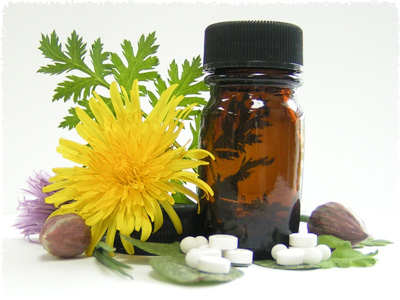This article was posted by CrystalWind.ca.
Homeopathy
- Details

In the late 18th century, a German physician named Samuel Hahnemann came upon a passage claiming that the quinine-containing Peruvian bark (chinchona) cured malaria. Using himself as a subject, Hahnemann swallowed a dose of Peruvian bark. He began to feel feverish, drowsy, desperately thirsty, and agitated - all of which he recognized as symptoms of malaria.
This caused Hahnemann to experiment further and form his theory that like cures like, or the Law of Similars. This law states that when a substance in large doses causes certain symptoms, in small doses it can cure these same symptoms. Some treatments in conventional medicine rely on this like-cures-like principle; vaccines, for instance, introduce small doses of an illness-causing agent to prevent disease.
Other important principles of homeopathy are dilution and succussion. Remedies are diluted and then "succussed," or shaken, in order to increase their potency. The process of successive dilution and succussion is called potentization.
How homeopathy works
Homeopathic remedies start with simple substances, such as herbs, minerals, or animal products. These substances are first crushed and dissolved in a specified amount of a substance—usually grain alcohol or lactose, mechanically shaken, then stored. This is the "mother tincture." Homeopaths further dilute tinctures with alcohol or lactose, either 1 part to 10 (written as "x") or 1 part to 100 (written as "c"), and then succuss these tinctures, yielding a 1x or 1c dilution. Homeopaths can even further dilute these tinctures two times (2x or 2c), three times (3x or 3c), and so forth. In clinical practice, any dilution may be used, but the most common are the 6x, 12x, and 30x and 6c, 12c, and 30c. The more diluted the substance, the more potent its healing powers are thought to be.
Rather than simply suppressing symptoms of a disease, homeopathic remedies act as catalysts that aid the body's inherent healing mechanisms. Moreover, homeopaths believe that any physical disease has a mental and emotional component. The homeopathic diagnosis is threefold, including physical symptoms (e.g., feverish), current emotional and psychological state (e.g., anxious, restless), and overall constitution of the individual (this includes more enduring qualities related to a person's creativity, initiative, persistence, concentration, physical sensitivities, stamina). The right remedy for a particular condition addresses all of these aspects and requires a highly individualized diagnosis.
Homeopathy is also used like other remedies, that is, according to symptoms. Health-food stores and some pharmacies sell homeopathic remedies for a variety of problems. Remedies are usually taken for no more than 2 or 3 days, though some people require only one or two doses before starting to feel better. If a remedy fails, it may be because it was the wrong substance for the set of symptoms.
What happens during a visit to the homeopath?
An initial visit to the homeopath can take from 1 to 1½ hours. Because homeopaths treat the person rather than the illness, the practitioner interviews the person at length, asking many questions and observing personality traits as well as unusual behavioral and physical symptoms. Determining the person's condition also includes a physical examination and possibly laboratory work.
What illnesses and conditions respond well?
Conditions that respond particularly well to homeopathic treatment include asthma, diarrhea, eczema and other types of skin rashes, depression, anxiety, hot flashes, chronic fatigue syndrome, and otitis media (ear infection).
Source Here
© CrystalWind.ca 2024. All content (articles, imagery, fair use) & design protected. Written permission required for copying. All rights reserved.
Join the Conversation Now! Comment Below! ![]()
Disclaimer Health
All post and information provided within this blog is for educational and informational purposes only, and is not to be construed as medical advice or instruction. No action should be taken solely on the contents of this website. Please consult with your healthcare professional before making any dietary or lifestyle changes or taking supplements that may interfere with medications. Any products or information discussed are not intended to diagnose, prevent, treat or cure any illness, disease or lifestyle. Please consult your physician or a qualified health professional on any matters regarding your health and wellbeing or on any opinions expressed within this website.

Spirit Animal Totem Of The Day!
Crystal Of The Day!
Latest Articles
CrystalWind.ca is free to use because of
donations from people like you.
Donate Now »

Unlock Your Light: Join Lightworkers Worldwide on CrystalWind.ca!
Follow Us!
Who is Online Now
We have 24829 guests and no members online
Featured This Month
Lammas by The Hedgewitch
Although in the heat of a Mid-western summer it might be difficult to discer... Read more
Lughnasadh Meditation
The Seventh Sabbat of the Wheel is Lughnasadh. Lughnasadh is celebrated on A... Read more
The Hazel Tree: August 5 - September 1
Celtic Symbol : The Rainbow Salmon Zodiac Degrees : 12º00` Leo - 8º59` Virg... Read more
Lugh - Celtic God Of The Sun
The god Lugh was worshiped in Ireland as a deity of the sun. This connection... Read more
The Season of Lammas
The season of Lammas (also called Lughnasadh) begins on August 1st and conti... Read more
Lughnasadh (Lammas) - The Celtic Harvest Fes…
The Celtic harvest festival on August 1st takes its name from the Irish god ... Read more










































